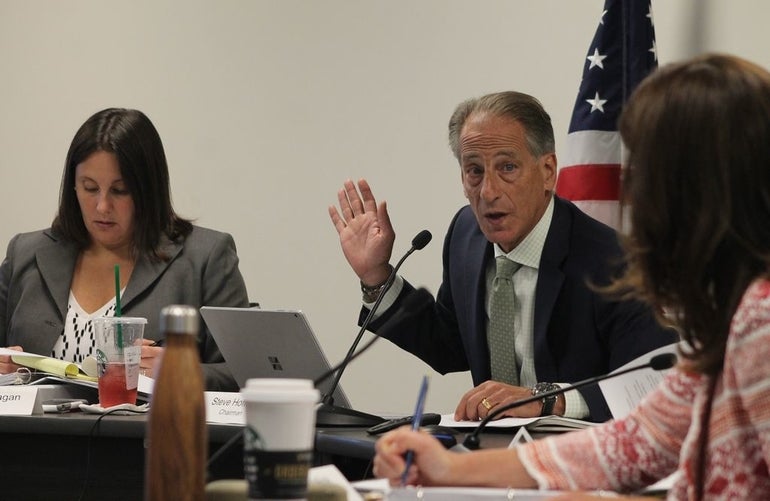The Cannabis Control Commission is weighing whether it will return to the Legislature to ask lawmakers who rewrote the 2016 ballot law legalizing marijuana to again revisit the law in order to clarify requirements related to the agreements marijuana businesses are required to enter into with their host municipalities.
The CCC has been wrestling with host community agreements (HCAs) for weeks as entrepreneurs and marijuana advocates have pointed to the contracts as one reason for the slower-than-anticipated rollout of the retail marijuana market and have lodged allegations that municipalities use the agreements to extract more from marijuana businesses than is allowed under the law.
“I listened to this conversation and I have read and studied, and talked to as many attorneys as I possibly can, read as many host community agreements as I possibly can … I believe there are some issues with the host community agreements that I have seen,” CCC Chairman Steven Hoffman said Thursday.
Hoffman said he spoke with several attorneys and did not find a common agreement on whether the CCC has the right to intervene with the contract between a municipality and a private business or whether the CCC has any obligation to review the agreements.
“My sticking point, and I don’t know how to get past it … I’m hearing 10 attorneys on both sides adamantly arguing the opposite point here,” Hoffman said.
He said the CCC’s general counsel has opined that the agency does not have the authority to intervene or reject an application based on the HCA and added, “It is very clear in my mind that this is ambiguous and undetermined whether we have the legal authority.”
Hoffman said his biggest concern is that “there is ambiguity” and suggested the ambiguity suggests that there is “an issue of clarity in the legislation.”
Voters in 2016 approved a ballot initiative to make marijuana use legal for adults 21 and older. The Legislature that December delayed implementation of many parts of the law for six months and last summer rewrote the ballot law.
The law calls for communities to enter into host community agreements with marijuana licensees and stipulates that those agreements cannot run for more than five years and that the community impact fee paid to the municipality by the licensee cannot exceed 3 percent of the establishment’s gross sales.
Because the CCC will not consider a license application until a host community agreement has been executed, marijuana entrepreneurs and advocates have complained that municipal officials use the agreements to secure contributions above and beyond the 3 percent cap from prospective marijuana businesses. The law states the fees “shall be reasonably related to the costs imposed upon the municipality” by the marijuana business.
On Thursday, the CCC rejected a motion of Commissioner Shaleen Title that the CCC include a review of host community agreements as part of its licensing process. Her proposal was to have the CCC limit its review of the agreements to ensuring that the community impact fee is reasonably related to the costs imposed upon the municipality by the operation of the marijuana business, no more than 3 percent of the business’s gross sales, and is limited to a term of five years.
Title was the lone commissioner to vote in favor of her proposal. The longtime marijuana activist said she viewed Thursday’s vote as “possibly the most significant decision we’re going to make in terms of how we affect what happens with this industry.”
“By rejecting authority to review host community agreements, the commission has done two things. First, they gave a green light to communities to continue assessing fees beyond the scope of the law,” Jim Borghesani, who served as spokesman of the legalization ballot initiative and now acts as a consultant to marijuana businesses, said. “Second, they extended the narrative that cannabis legalization triggers increased social costs, a narrative proven false in other legal states.”
Some commissioners said they were concerned that reviewing HCAs as part of the commission’s licensing process would open the young agency up to legal challenges and further delay the launch of an industry for which nearly 1.8 million residents voted for almost two years ago.
“I have concerns that if we start going into these HCAs, that we are going to be sued, that we are going to delay the process, that a simple anticipated hour of inspection, if we don’t get it right then we’re going to come back and be told we didn’t do it right,” Commissioner Jennifer Flanagan said.
Title pushed back on the notion that the review would cause a substantial delay, pointing to Executive Director Shawn Collins’ estimation that Title’s proposal would require the CCC to train its inspection staff in identifying critical information in an HCA and that reviewing each document would take about one hour.
Instead, the commission agreed to direct its staff to request host community agreements from all applicants and to use public records requests to obtain the agreements that are not voluntarily provided. Hoffman also directed the staff to develop a way to review the agreements before sharing with the commission what it has learned.
Hoffman said the CCC will decide at a later date, based on what the agency learns from the HCAs it obtains, whether to seek an update to the marijuana law from the Legislature.
Rep. Mark Cusack and Sen. Patricia Jehlen, the co-chairs of the Joint Committee on Marijuana Policy, wrote a letter to the CCC in which they wrote that it was their “interpretation, and intent, that the CCC has the authority and is required to therefore review any such community host agreements to ensure their compliance with statute.”
“Given these statutory underpinnings, it is our hope that the CCC will ensure the conformance of these laws with respect to issuing any such licenses to prevent municipalities from using community host agreements as a form of prohibition,” the co-chairs wrote in July.

